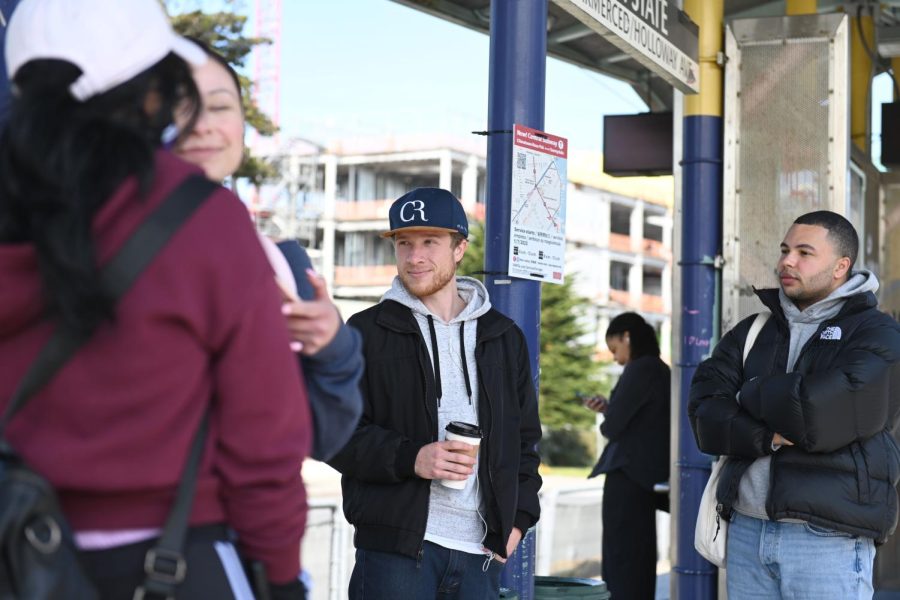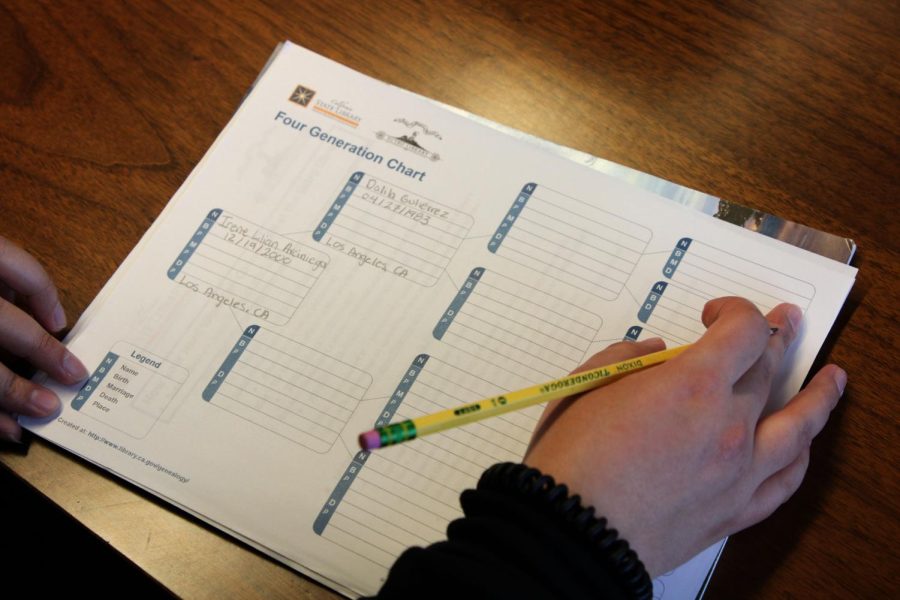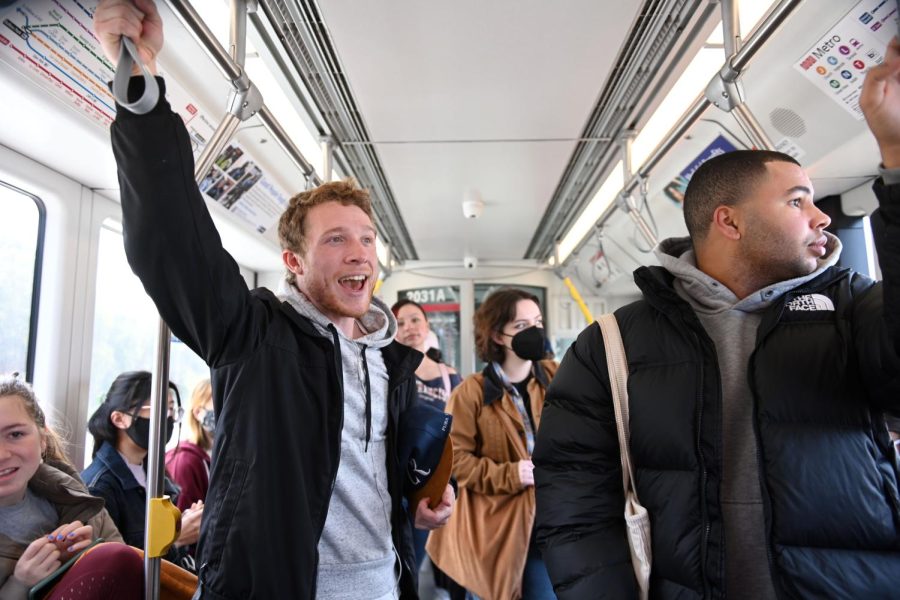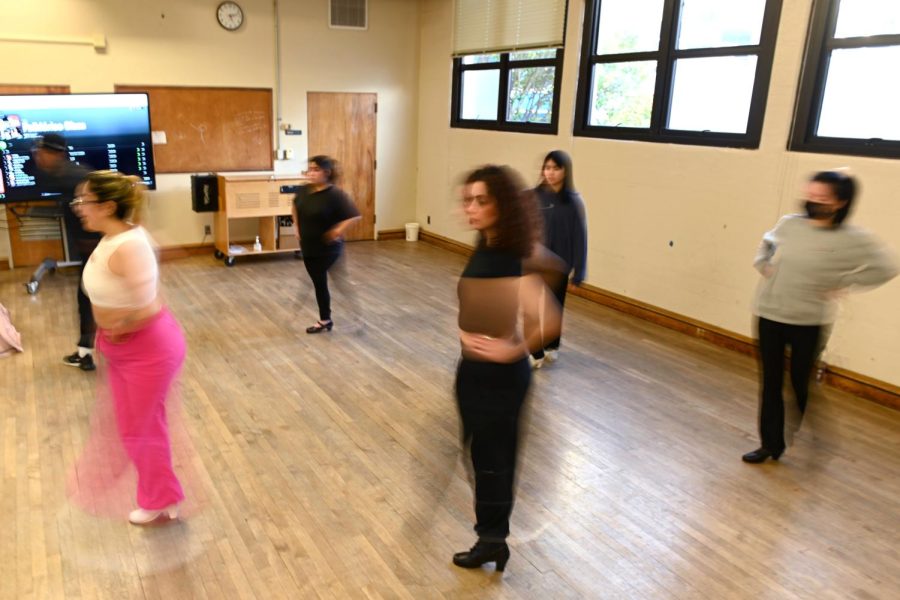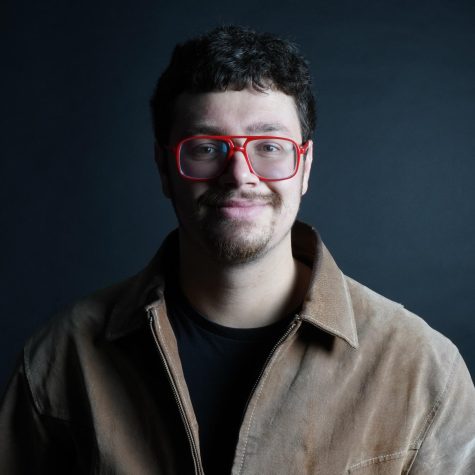Exploring the Non-Traditional
From dancing classes to mythical lore lessons, SF State’s EXCO courses offer a curriculum that traditional courses can’t compete with.
Adrian Jose Fernandez (middle), 25, a creative writing student and student-instructor, chats with fellow students as business marketing student Jake Redmond (right), 22, looks on during the Writing on the Muni class at SF State, in San Francisco, Calif., on Friday, March 3, 2023. The class is part of SF State’s Experimental College, a collection of student-teaching-student courses that range from Mexican folkloriko dance to genealogy. (Aaron Levy-Wolins / Xpress Magazine)
Gray clouds fill the dull, sunless sky. Hail from last night’s storm remains frozen on the ground. A break in the rain gives way to a seemingly empty SF State campus. Yet four students find their way to room 106 of the desolate HSS building on this dreary Friday afternoon to participate in in-depth discussions about their favorite fictional character, Percy Jackson.
The student-run “Percy Jackson and the Olympians” course may have not been found on the original Experimental College roster, but the sentiment remains the same: A progressive peer-to-peer teaching of subjects chosen by students.
SF State’s original Experimental College, or EXCO, came to life in 1965 when a group of students who were unhappy with traditional teaching tactics and out-of-touch curriculum developed courses that highlighted student interests, culture and current events. During this time students were also protesting racial discrimination, the Vietnam war and campus reform. In 1969, following a series of on-campus strikes, the program fell into disuse.
In 2017, SF State’s Experimental College was revamped to gain more perspectives from students. Students who take advantage of these niche classes can fulfill one upper division elective credit, while students who teach can earn up to four units. These intimate, after-school, club-type classes that the university provides are largely underutilized despite the interesting non-traditional topics, such as psychedelics and writing on the muni. However, the students who do enroll in these classes are genuinely interested in the subjects and lucky enough for them, classes can run with as few as one student.
EXCO’s mission is to “create a space for SF State students to develop leadership skills as they share their voices, backgrounds and passions in a mutually supportive community of peers.”
“Workshop on the Kennedy Assassination,” “Grass, Acid and Zen,” and “Planes of Social Consciousness,” were some of the classes included in the 1967 Experimental College course catalog. Here’s a look at some of the courses currently offered.
Genealogy
Do you really know who you are? Albert Feaster helps “break it down to the compound” with a genealogy class that helps students trace their lines of descent and development.
“My approach to genealogy is to raise your level of consciousness, so you can accept whatever your truth turns out to be,” Feaster explains.
Feaster can trace his own lineage all the way “back to the beginning,” and got into genealogy when he went looking for the truth and found it.
According to Feaster, if you don’t have a good understanding of who you are, it’s easy to accept anything you’re labeled as and be placed in a hypothetical box.
Recently, Feaster’s genealogy class visited the fifth floor of SF State’s library, better known as the Sutro Library. The Sutro Library is home to one of the largest genealogy collections on the West Coast and provides vast resources regarding ancestry such as historical and lineage society publications and archival collections. He tasked students with the assignment of filling out their family trees in order for them to get a better understanding of who they are.
Irene Arciniega, an SF State senior, didn’t know who she was when faced with the question. She’s hopeful the EXCO genealogy course will help her figure it out.
“I’m starting to kind of understand a little bit more about myself, I’m trying to figure myself out,”Arciniega said. “Specifically, the genealogy class. I feel like if you’re trying to learn more about yourself, it’s the class to pick out.”
Feaster took an EXCO course about “adulting” during his first semester at SF State. Once he learned any student could instruct an EXCO course about anything they had knowledge of, Feaster signed on to teach about Genealogy.
“Taking a genealogy course, you will know exactly who you are,” Feaster explained. “You will find yourself.”
Writing on the Muni
As they wait at the Muni stop on 19th and Holloway, students discuss their favorite music and movies. It’s been over 20 minutes since the last train arrived at the typically bustling stop – the field trip day is off to a late start. The question, “Will the train ever come?” lingers in the air.
Creative writing major Adrian Jose Fernandez combines his love of writing and love of Muni in the appropriately titled “Writing on the Muni EXCO course.” Today, the class is headed to Dolores Park for poetry writing. Immediately apparent is also Fernandez’s love of history, which he sprinkles in during the ride from the bus stop in front of SF State all the way to the stop at Church and Market Street.
He begins his poems with a list. On today’s list: the shoes everyone’s wearing.
“I like to say that this class is actually a writing group disguised as a field trip class,” Fernandez explained.
Writing on the Muni hosts a field trip every other Friday. And when the class isn’t catching the train, they’re in room 104 of the HSS building for writing workshops. Students are encouraged to write whatever they are interested in, whether it be screenplays, poems, short stories, longer stories or even haikus. For Fernandez, feeding off the group energy contributes to the ease and quality of writing.
“The primary goal is to grow as a writer, and for all of us to encourage one another,” Fernandez said.
When Didi Gomez, a cinema major originally from Mexico, relocated to San Francisco last semester, she found it difficult to balance her work, school and social life. She enrolled in “Writing on the Muni” this semester to explore her new city and meet new people. Honing her writing skills is a bonus.
“It feels like a community,” Gomez said. “It feels nice, you can have this group of people you share your stories with.”
Mexican Folklórico Dance
When Debra Avelar-Casteneda was 7, she attended her first Mexican folklórico dance class to support her cousin who had trouble walking. Dance class was a cheaper alternative to physical therapy. As the muscles in her cousin’s legs grew stronger, Castenda simultaneously found herself on a path of self-discovery through folklórico dance.
“It made me feel more connected to my roots,” said Casteneda, an SF State senior dance major and first-generation Mexican American. “When you’re dancing, you’re just identifying as a dancer (not as Mexican or American), but you’re still being part of your culture, so it made me feel very much at home.”
Casteneda danced with groups such as Fuego Nuevo and draws inspiration from various artists she’s crossed paths with over the years.
On Thursdays at 4 p.m. she can be found spreading her love of dance and culture in Gym 123, as she instructs the class in both fundamental movements and history of traditional Mexican folklórico dance.
Percy Jackson and The Olympians
Synphanie Crawford left to be with her family in Philadelphia at the height of the Coronavirus pandemic. One night, when her 12-year-old sister couldn’t sleep, she reached for her Percy Jackson novels to help console her. Crawford, a self-proclaimed Percy Jackson fan, takes her love of the series and applies it to this EXCO course.
In “Percy Jackson and the Olympians,” students meet and “geek out” over the love of Percy Jackson. They participate in discussions and assignments such as picking their godly parents. Crawford herself chose three parents: Athena (the goddess of wisdom), Aphrodite (the goddess of love) and Hypnos (the god of sleep).
“I’m doing it because I wanted to do something that I love before I graduate, and I wanted to have some fun this semester,” Crawford said. As the instructor, she also gets four units.
Mamadou Bah, a graduating senior and computer science major, doesn’t need the single unit this class offers, rather, he’s taking the course because he’s genuinely interested and wanted to take something fun his last semester.
“I loved Percy Jackson growing up as a kid, and still to this day it’s one of my favorite books,” Bah said. “I have a sentimental attachment to it, it’s nice to be with a group that knows the fine-tunings of the story.”
Crawford first heard about SF State’s Experimental College when one of her friends was taking a BDSM class. At the time, Crawford needed one extra unit so she decided to enroll in an anime course.
“It was really fun because I got to talk about so much cool stuff with like-minded people, and it was my favorite class,” Crawford said.
Reading the books isn’t required in order to take the class – in fact, the class currently has two students who have yet to read the series.
“I just want them at the end of the class to at least be interested or willing to read the book,” said Crawford.
The History and Influence of Graphic Novels in America
Did you know that Green Lantern was the first LGBTQ character in the Justice League? Or that the 1940s is considered the Golden Age of comics? Dakota Washington, a third year BECA major, explores these questions and more in his “History and Influence of Graphic Novels in America” EXCO course.
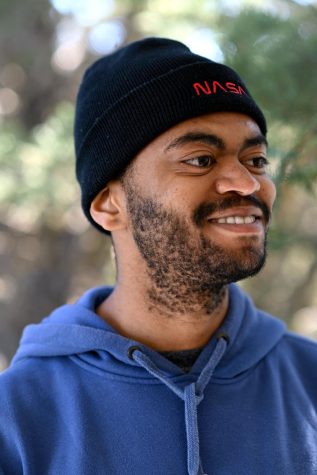
The course explores how comics and characters developed into movies and TV shows, and how “nerd culture” has crossed over into the mainstream.
“I hope my students gain more knowledge and appreciation for the long-lasting stories created by comics,” explains Washington.
Although Washington had never dabbled in EXCO courses before — either as a student or teacher — he hopes to teach abroad after graduation.
“I don’t really know exactly what made me want to teach an EXCO course; when I graduate, I want to teach English abroad, so that was probably in my head when I saw the flier,” said Washington. “I decided on comics or graphic novels more specifically because I own more of them. I wanted to expand my own knowledge of comics too.”
In the future, Dan Curtis-Cummins, director of SF State’s Experimental College would like to see more partner work with student organizations.
“If we had a class based on an issue or a topic, like cops off campus or the union org of the students for quality education, I would like to see more classes like that,” Cummins said. “A Black Lives Matter course, I would like to see more classes like that.”
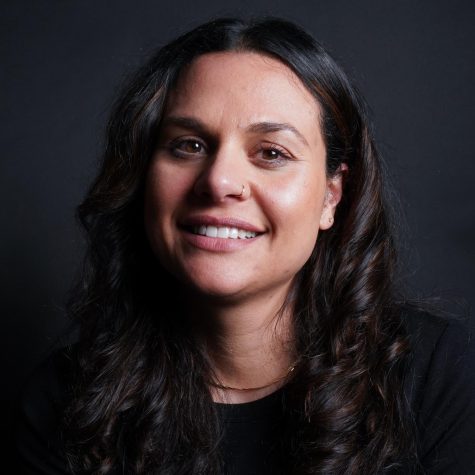
Angelina Casolla, born and raised in San Francisco, is a staff writer for Xpress Magazine. Prior to attending SF State she attended Cal State Long Beach...
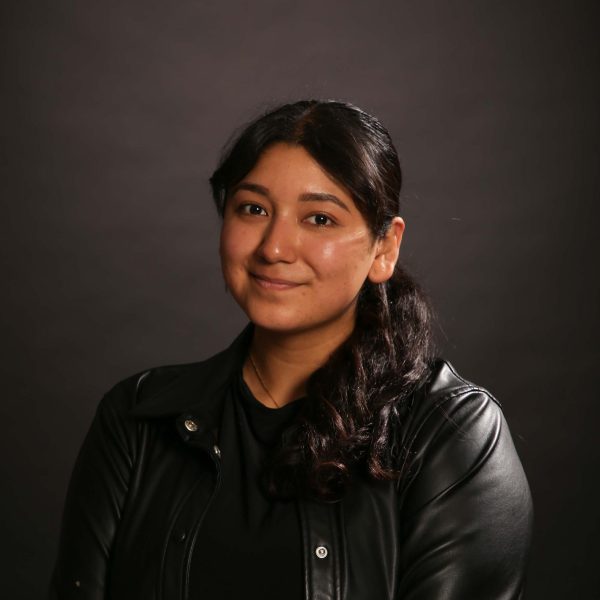
Leilani Xicotencatl (she/her) is the Photo Editor for Xpress Magazine and a photographer for Golden Gate Xpress. She was born and raised in Anaheim, California....


